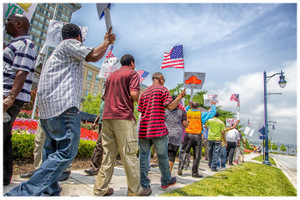Nestled along the shores of the Potomac River, just over the D.C. line in Prince George’s County, is a privately-owned $3 billion resort and mini-city, that’s growing.
The Peterson Company likely couldn’t have built National Harbor without hundreds of millions in taxpayer dollars invested in the harbor’s roads and other infrastructure needs.
The public investment was worth it, officials explained at the time, because it would bring jobs. But fast-forward five years and the promise of local jobs seems a distant one, at least when it comes to taxis.
While the local taxis are good enough for Prince George’s residents, they don’t seem to cut it for National Harbor’s largest hotel, the Gaylord National. Despite having faithfully served the Gaylord’s guests since its opening, cabbies are now being shunned in favor of Veolia, a French multinational water, waste and transportation company.
(Veolia’s roots go back, way back. Napoleon III created Veolia’s predecessor by Imperial decree in 1853. Today, the company has over 300,000 employees in more than 70 countries and a (2012) revenue of $38 billion. But Veolia’s rise hasn’t come without controversy. The company has faced questions about corruption, as well as possible human rights abuses, including most recently in Israel’s occupied territories.)
Access to guests at National Harbor, and the Gaylord in particular, is key to the survival of Prince George’s cab drivers. There’s nothing else like it in the county. If they’re pushed out of the harbor, there’s really nowhere else for them to go, since the county’s metro stops already have long queues of taxis waiting for a fare.
With their backs against the wall, the cabbies are fighting back. Over the past month, they’ve held a series of escalating protests outside the Gaylord. (And inside as well, with allies from the AFL-CIO staging a flash mob in the ornate lobby.)
What touched off the driver protests was the introduction of Veolia’s hybrid vehicles, priced to compete directly with taxis. The hybrids supplement Veolia’s existing fleet at the Gaylord, which includes luxury black sedans and blue SuperShuttle vans, all of which park directly in front of the hotel.
Meanwhile, taxis must wait on the third floor of a parking garage, across a field and two streets from the hotel, out of sight of guests. And for this right, cabbies must pay $60 a month (it used to be $30 a month but doubled without notice several months ago, drivers report).
For their part, cabbies at National Harbor don’t fear competing with Veolia. In fact they welcome it, so long as it’s fair. But it hasn’t been.
“We need a taxi stand right now [so] the public [can] see us,” said Fisseha Tessfaye, a cab driver leader at National Harbor. “They say there are no cabs in this area. But we are here… We are trying to serve the community, but we are forced to be off the street.”
For cabbies to succeed in their struggle to be seen at National Harbor they’ll need public support, which the harbor and county police seem determined to prevent. NBC 4 was told by National Harbor security that it couldn’t film the cab driver protest without prior approval from the harbor. And county police have been issuing $60 tickets to cabbies and other drivers who honk their horns in solidarity as they drive by the protesters.
All of this is taking place despite the fact that National Harbor has been the beneficiary of enormous public investment, with much more taxpayer support likely coming in the near future as the harbor expands inland.
Presently roadwork is being done where National Harbor’s Tanger outlet mall is expected to open this holiday season. And an MGM casino is scheduled to come online in 2016, likely requiring additional substantial public dollars.
While local taxes have been pumped into National Harbor, local taxis are being pushed out. The cabbies’ jobs are being handed over to Veolia, which has been given a near-monopoly at the Gaylord.
“This is a fight about local business [and] local workers against multinational corporations,” Beth Levie of the AFL-CIO said at one of the recent protests outside the Gaylord. “We’re going to [keep coming] back here until we get the right for these local taxis to pick up guests at National Harbor.”

